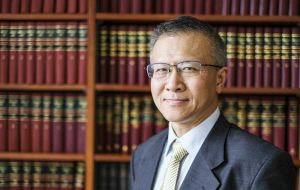MercoPress. South Atlantic News Agency
Musk, Mao and Trump’s imperial dreams
 When Musk announced the foundation of the ‘America Party’, the public response fell considerably short of rhapsodic
When Musk announced the foundation of the ‘America Party’, the public response fell considerably short of rhapsodic  Zhang Qianfan, a constitutional law professor in Beijing, calls the rapid Trumpist takeover of US politics against only feeble resistance “America’s Cultural Revolution”.
Zhang Qianfan, a constitutional law professor in Beijing, calls the rapid Trumpist takeover of US politics against only feeble resistance “America’s Cultural Revolution”. By Gwynne Dyer - The only place where some people still see Elon Musk as a political genius is China. “Brother Musk, you’ve got over a billion people on our side backing you,” wrote a fan on Weibo, China’s biggest social media site. “If Elon Musk were to found a political party,” wrote another, “his tech-driven mindset could inject fresh energy into politics.”
Distance lends enchantment, but the home market is a harder sell. Back in the USA a few days later, when Musk announced the foundation of the ‘America Party’, the public response fell considerably short of rhapsodic. Tesla shares fell 7.5% the next day and Musk’s personal stake in the company fell by US$10 billion.
“Disruption and chaos”
President Donald Trump pretended pity for his former ally for about ten seconds – “I am saddened to watch Elon Musk go completely off the rails” – before reverting to form: “The one thing Third Parties are good for is the creation of Complete and Total DISRUPTION AND CHAOS.”
Like a stopped clock, Trump is occasionally right, and this may be one of those times. Musk may seem completely out of control, but if he gets the strategy right his new political party could spread disruption and chaos right within the ranks of the Republican Party.
Most American political analysts have dismissed the electoral prospects of Musk’s new party. After all, new third parties have not broken the grip of the two-party system in the United States for more than a century. However, third parties have often determined the outcome in races between the two big parties.
There isn’t time for Musk to build a nationwide third party in the twenty months between now and the mid-term elections for the Senate and the House of Representatives in November 2026. That’s when he plans to launch his first challenge to Trump, but he doesn’t need a nationwide party for that. Indeed, he probably never intends to go that route.
Musk often claims to have won the 2024 election for Donald Trump with his massive donations (US$ 277 million) to various elements and supporters of the Republican Party, but it was those people and organizations who actually put the money to work in Trump’s campaign. This time he won’t have them on his side, and a different strategy is needed.
It’s still a strategy that would take large amounts of money, but that is no issue for Musk. His current wealth (slightly discounted by recent events) is still around US$ 400 billion, or about US$ 2000 for every American voter. Besides, he doesn’t need to buy all of them, or even most.
All Musk has to do in 2026 is unseat two or three Republican incumbents in the Senate and half a dozen in the House, and the Republicans lose control of both houses of Congress. Concentrate on twenty Republican-held Senate seats and fifty marginal House seats and spend a hundred million dollars in each one. That ought to do the trick.
Would Musk really do that? It would be one of history’s biggest tantrums, and all he would get out of it is the satisfaction of creating a potential majority in Congress that might repeal or at least modify Trump’s ‘One Big Beautiful Bill’. Trump would still be president, but Musk really seems to believe that an extra three trillion dollars on the national debt matters.
Would Musk get away with it? Of course not. However, the measures Trump would take to thwart Musk’s strategy might mark a decisive break with the current constitutional order. Many people fear it’s coming anyway, but in practice it needs a crisis. This could be it.
Foreign analysts can sometimes see analogies and parallels in American politics that Americans themselves miss. Some Chinese scholars, in particular, make disturbing comparisons between Trump and Mao.
“America’s Cultural Revolution”
Zhang Qianfan, a constitutional law professor in Beijing, calls the rapid Trumpist takeover of US politics against only feeble resistance “America’s Cultural Revolution”. Ding Xueliang, once a Red Guard and now professor of Chinese politics at the Hong Kong University of Science and Technology, says “It’s not identical, but there are certainly parallels”.
Many people in China see the war on ‘woke’ and on elite universities in America, the mistrust of bureaucracy, the hatred of the ‘deep state’, and the cult of the leader as symptoms of an anti-intellectual drive as strong as that in China under Mao. Above all, they remember that Mao destroyed the bureaucracy, purged the Party, and effectively made himself emperor.
“During Trump’s presidential inauguration speech, Republican lawmakers all stood up and applauded with such fervor that it rivaled North Korea. These are deeply troubling signs,” Zhang said. Or as Trump said when Xi Jinping abolished term limits and made himself president-for-life: “I think it’s great. Maybe we’ll have to give that a shot someday.”




Top Comments
Disclaimer & comment rulesCommenting for this story is now closed.
If you have a Facebook account, become a fan and comment on our Facebook Page!